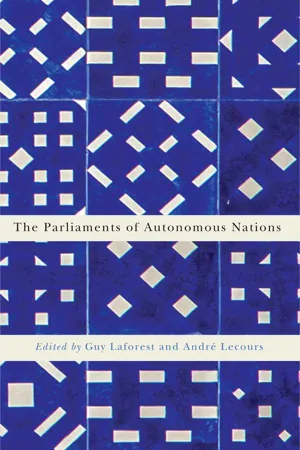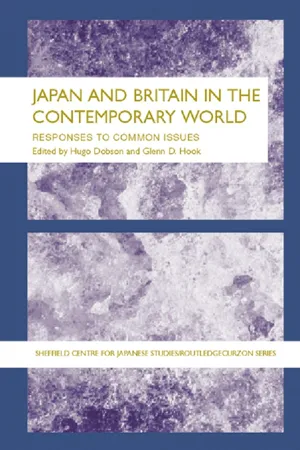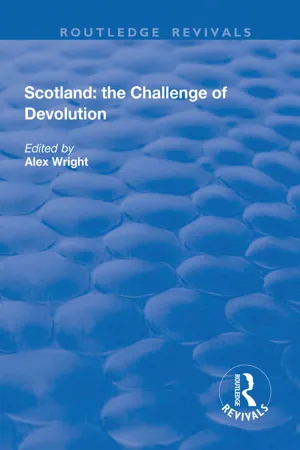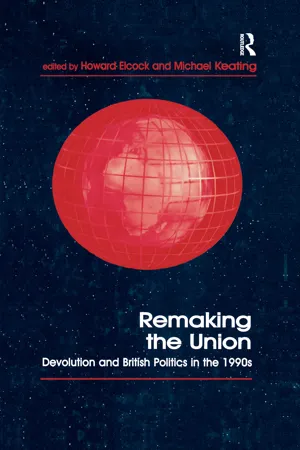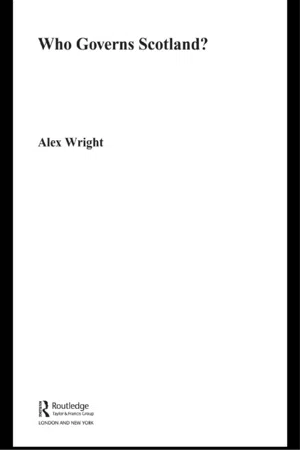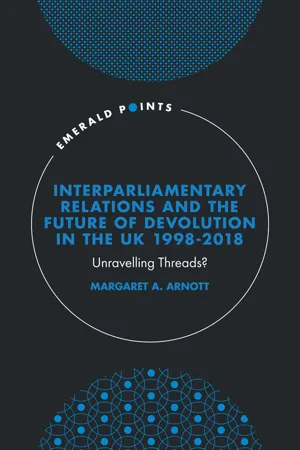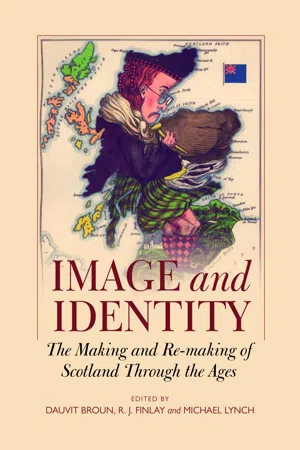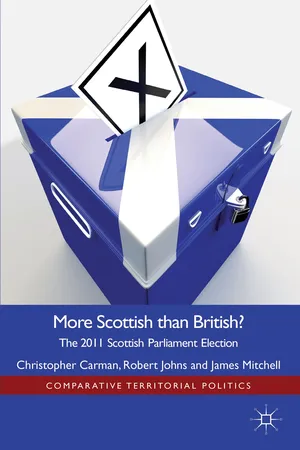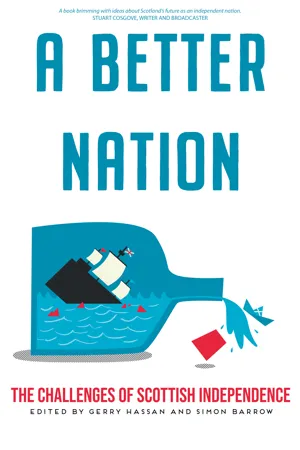Politics & International Relations
Scottish Parliament
The Scottish Parliament is the devolved, unicameral legislature of Scotland, with powers over areas such as education, health, and justice. It was established in 1999 following a referendum, and its members are elected through a mixed-member proportional representation system. The Parliament has the authority to make laws on a range of issues affecting Scotland, while certain powers remain reserved to the UK Parliament.
Written by Perlego with AI-assistance
Related key terms
Related key terms
1 of 4
Related key terms
1 of 3
10 Key excerpts on "Scottish Parliament"
- eBook - ePub
- Guy Laforest, André Lecours(Authors)
- 2016(Publication Date)
- McGill-Queen's University Press(Publisher)
The achievement of the Scottish Parliament, however, has been to become a local version of Westminster, or other European parliaments, rather than a new type of body. The small size of the country and the spirit of devolution make it more accessible than Westminster, a finding confirmed by research among Scottish interest and advocacy groups. 27 Actors like the business community, who initially thought to bypass it because of their strong links into London, have been obliged to play the Scottish political game; 28 but this has not fundamentally altered the balance of power between the executive and the legislature. NOTES 1 This was the case of McCormick vs the Lord Advocate, concerning the use of the title Queen Elizabeth II in Scotland, when neither Scotland nor Great Britain had had an Elizabeth I. 2 Since 1800 the state is the United Kingdom of Great Britain and Ireland (since 1922 Northern Ireland). It is correct to distinguish this wider United Kingdom (UK) from Great Britain. 3 Tony Blair, as his memoirs show, was no home ruler but was given no choice. 4 Around 1983 I had advised Labour’s devolution committee that the new body should be called a parliament, that it should be elected by proportional representation, that the reserved and not the devolved powers should be specified, and that the European Convention on Human Rights should be incorporated in the legislation. All four suggestions were rejected at the time but eventually featured in the 1998 Scotland Act. 5 Constitutional legislation is by convention taken on the floor of the House of Commons and there is an emerging convention that major changes in devolution or electoral systems will be subject to referendum - eBook - ePub
Japan and Britain in the Contemporary World
Responses to Common Issues
- Hugo Dobson, Glenn D. Hook(Authors)
- 2003(Publication Date)
- Routledge(Publisher)
Table 9.1 ).Defining the reserved powers of Westminster in the Scotland Bill rather than those of the Scottish Parliament, and thus reversing the approach of the Scottish Constitutional Convention, which had been less daring and had wanted the powers of the new Parliament defined, can be seen as having moved the goal posts slightly in the direction of home rule rather than devolution.1 All areas not reserved, as shown in Table 9.1 , fall thus under the remit of the Scottish Parliament. Still, ultimate sovereignty rests with Westminster or – despite the denial of Eurosceptics – with Europe.Table 9.1 The Scotland Act and the division of powers-
Reserved Powers• The Constitution of the UK • UK Foreign Policy including relations with Europe • UK Defence and National Security • The Protection of Borders • The UK’s Fiscal, Economic and Monetary System • Common Markets for UK Goods and Services • Employment Legislation • Social Security • Regulation of Certain Professions • Transport Safety and Regulation • Aspects of Health and Medicine, Media and Culture
- Powers of the Scottish ParliamentAll areas not reserved including: • Health • Education (from pre-five education to higher education) • Training • Local Government • Social Work • Housing • Economic Development • Transport • Law and Home Affairs • Environment • Agriculture, Fisheries and Forestry • Sport and the Arts • Research and Statistics
Union and Home RuleIn 1979, the Scottish Referendum on Devolution failed on a technical obstacle (the 40 per cent threshold). The 1997 referendum saw an overwhelming majority (74 per cent) voting in favour of home rule. The changes since 1979 are significant, but they are embedded in long-term changes the roots of which are to be found in the very arrangements of the 1707 Union. Whilst the Parliament was dissolved and merged with the British government located in Westminster, Scotland retained the institutional framework of its civil society. In the compromise of a ‘negotiated autonomy’ of the Union (Paterson 1994: 27–45; 1998: 7–9), the Scots seemed less concerned with keeping their corrupt Parliament than with retaining their institutions of civil society. The Kirk,2 education, the independent Scottish legal system, and local administration remained under the control of the Scots, with little interference from south of the border, namely Westminster. What Lindsay Paterson calls the ‘autonomy of Scotland’ was not challenged by the Union until the nineteenth, arguably the twentieth century, when Britain developed from a pre-modern ‘ancien régime’ into a modern state (Brown et al - eBook - ePub
- Alex Wright(Author)
- 2018(Publication Date)
- Routledge(Publisher)
How does this dominant view of the UK regard the current change process in Scotland? The answer is likely to be that devolution is the preferred policy of the Westminster Government on which it consulted with the people of Scotland through the device of the two-question referendum in September 1997. Once the Government's intentions had been legitimised by the Scottish people, legislation was brought forward to create the devolved Scottish Parliament. However, the initiative, and the crucial impetus, came from Westminster, and the Westminster Parliament remains sovereign, as the 1997 White Paper and the 1998 Scotland Act explicitly confirmed (Bogdanor 1998: 288; MacCormick 1999: 59). In the social science devolutionary jargon, the 1998 Act confirmed Westminster as 'superintendent', and Edinburgh as 'subordinate' (Sabel 1997).In creating devolved government for Scotland, Westminster primarily offered Scotland a means of providing democratic scrutiny over its existing areas of policy autonomy. As MacCormick (1998: 143) puts it: 'In place of managed quasi-federalism, there will be democratic quasi-federalism.' However, it is also important to note that the Scotland Act extends the sphere of Scottish autonomy, making the Parliament considerably more powerful than the German lander (SAC 1998, Vol. 2: 42), and that the 'retaining model' (McFadden and Lazarowicz 1999) provided by the Act offers scope for further developments in the powers and competencies of the Parliament.The dominant view of constitutional change seems likely to lead to a particular view of how multi-layer democracy is to be managed. In particular it would be expected to seek approaches to political management which assert and reinforce a hierarchy of politicians. Indeed, it could be argued that simply setting out the 4 layers, A to D, as above, implicitly accepts such a hierarchy. Within this view, there would be some tension between those who think - eBook - ePub
Remaking the Union
Devolution and British Politics in the 1990s
- Howard Elcock, Dr Michael Keating(Authors)
- 2013(Publication Date)
- Routledge(Publisher)
What Could a Scottish Parliament Do?
JAMES MITCHELLDiscussions of the powers of the proposed Scottish Parliament often begin and end with a definition of its competencies. However, a number of considerations are required to ascertain the real scope of any Scottish Parliament, its autonomy and its powers. A distinction between power and responsibility needs to be drawn at the outset of any discussion. To devolve responsibilities without power is the devolution of penury (Meny and Wright, 1985: 7). The centre in various systems of government have often devolved difficult decisions to local parliaments and tiers of government. The ‘new federalism’ under Reagan in the United States was a classic example of this. Reagan declared support for the restoration of American federalism. In practice this involved devolving responsibilities to the states and halting many of the federal government’s subsidies to the states (McKay, 1985). The key to any understanding of the extent to which powers or simply responsibilities are being devolved is finance. The grant structure rather than tax levying powers of the Scottish Parliament will be crucial in this respect (see contribution by Heald).In this analysis a number of other considerations are explored: first the legal definition of powers; second, Westminster’s ‘over-ride’ powers, which will set important parameters within which a Scottish Parliament may operate; third, different types of policy and the prospects for autonomy in each type of policy; fourth, interdependence; and finally, the dynamic nature of institutional development.This contribution considers what a Scottish Parliament could do by focusing on these considerations rather than on specific policy areas. An underlying assumption here is that any attempt to consider what a Scottish Parliament might do must begin by considering these matters. Another underlying theme is that much of the devolution debate has been unduly influenced by black letter legal terminology. Concern with ‘entrenchment’ as a legal right has meant that less importance has been attached to notions such as authority and legitimacy. An implicit argument here is that lack of legal entrenchment will prove less important than ensuring that the Scottish Parliament gains authority and legitimacy. The autonomy of the parliament will be entrenched in the sense that its competencies and very existence will depend less on any clause in the founding legislation than in its subsequent perceived success or failure. In addition, it is not possible to define powers discretely to each ‘level’ of government. - eBook - ePub
- Marina Dekavalla(Author)
- 2018(Publication Date)
- Manchester University Press(Publisher)
It thus became a major player in day-to-day Scottish politics. Throughout this early post-devolution period independence, although present, was not at the core of the SNP’s political rhetoric, which focused primarily on its policy and governance proposals (McNair, 2008). This was probably meant to avoid alienating voters who were still on the whole sceptical about independence. Indeed, even after the party came to power, support for independence remained consistently below 30 per cent and stayed there well into the independence referendum debate. The first two elections in 1999 and 2003 delivered a Labour–Liberal Democrat coalition. In the early years the devolution project and the Scottish Parliament drew negative coverage and criticism by the Scottish press. According to Winetrobe and Hazell (2005 : 66), the media’s ‘unexpected ferocity’ in covering devolution ‘had a crucial negative impact on the perception (and self-perception) of the young parliament, and devolution itself’. Controversy was caused over a number of issues including the high cost of the building that housed the parliament, the decision to abolish a law prohibiting schools from ‘promoting’ homosexuality, infighting in the government, speculations about individual MSPs’ integrity. At the same time, though, the economy was going well, the Scottish Parliament took some decisions that departed from policies in England, such as providing free medical prescriptions for all patients and free personal care for the elderly, or banning smoking in public spaces before this was introduced in England. Overall the structure and procedures of the parliament meant that parliamentary committees had more power in Holyrood than in Westminster and that the parliament itself was more independent from the government (Winetrobe and Hazell, 2005) - eBook - ePub
- Alex Wright(Author)
- 2004(Publication Date)
- Routledge(Publisher)
8 2003 A Scottish foreign policy?
The Labour party believes that there are long-standing connections, common interests, which united the parts of the United Kingdom. Obviously Europe will impact more and more upon all of us. But I don’t see us going down a nationalist road at any point(Donald Dewar 1991)1Although Scotland has yet to take the ‘nationalist road’, the first four years of devolution2 has been something of a roller coaster ride.3 For example, during this period there were three First Ministers in quick succession (Dewar, McLeish and McConnell). However, for the most part, the Labour and Liberal Democrat coalition managed to ensure that there was a degree of coherence to Scotland’s government, despite ministerial changes. Even so, in 1999 Scottish politics was an amalgamation of aspiration and symbolism. There were high hopes that the parliament would transform Scotland for the better – in contrast to years gone by – when there had been a growing perception that Scotland had been misgoverned by politicians in London. Now once again Scots would govern themselves, and, in so doing, it was expected that the country would be administered better. That though has been something of a mixed blessing for the country’s political elite. Ministers and officials from the Scottish Executive now had to face MSPs at Holyrood.4 Yet, whilst the government of Scotland has become rather more transparent (though some might say ‘not enough’), doubts persist over Scotland’s autonomy.That was particularly so in relation to international affairs where, formally, competence was reserved to Westminster. Moreover, despite the inception of the new parliament, decisions on a swathe of policies were decided in Brussels, and, international forces beyond the UK’s borders also stood to affect Scottish matters. Yet both the Executive and the parliament had to prove their worth, at a time when devolution was in its infancy. Given that their autonomy was limited, this would be no easy task. More particularly, under the current pragmatic constitutional arrangements surrounding inter-governmental relations between Edinburgh, London and Brussels, there was the risk that Scottish ministers could inadvertently exceed their authority in their attempts to fight Scotland’s corner on the inter- national stage, or of course underplay their hand. Would a nascent Scottish foreign policy be no more than a trompe l’oeil - eBook - ePub
Interparliamentary Relations and the Future of Devolution in the UK 1998-2018
Unravelling Threads?
- Margaret A. Arnott(Author)
- 2024(Publication Date)
- Emerald Publishing Limited(Publisher)
In reaching this Agreement, the Scottish Government recognises the Scottish Parliament’s primary purpose of scrutinising the activity of the Scottish Government within formal inter-governmental structures. The Scottish Parliament also recognises and respects the need for a shared, private space for inter-governmental discussion between the administrations within the United Kingdom, such as in situations where negotiations are on-going.(Scottish Government Strategy and Constitution Directorate, 2016) It set out three main principles that would ‘govern’ relationships between the Scottish Parliament and the Scottish Government concerning IGR:- transparency;
- accountability;
- respect for the confidentiality of discussions between governments.
Inter-Parliamentary Forum on Brexit
Weaknesses in IPR and inter-governmental mechanisms have been evident from the early years of asymmetric devolution. These weaknesses have become even more marked following the UK EU Referendum in June 2016. Liaison between the devolved legislatures and the UK Parliament has now also been recognized as a gap in the working of devolution. In its report on ‘Devolution and Exiting the EU: reconciling differences and building strong relationship’ (July 2018), the Commons Public Administration and Constitutional Affairs Committee (PACAC) argued that IPR should be central to the reform of devolution following the United Kingdom's exit from the European Union:One of the central constitutional roles of parliaments and assemblies in the UK political system is to scrutinize the work of government. With the increase in the extent of inter-governmental relations, which must inevitably follow the UK’s exit from the EU, it is imperative that mechanisms be developed to scrutinize properly the work done at the inter-governmental level. The importance of devolution within the UK’s constitutional architecture should be recognised by developing mechanisms and procedures for the different parliaments and assemblies of the UK to communicate formally with one another. This is essential in order to build understanding and friendships between parliamentarians from all UK legislatures, as well as strengthening public trust and confidence in the way that the four parliaments and assemblies can work together. - eBook - ePub
Image and Identity
Making and Re-making of Scotland Through the Ages
- Dauvit Brown, Dauvit Brown(Authors)
- 2001(Publication Date)
- John Donald(Publisher)
This paper has addressed the issue of an institutional identity in the form of the Scottish Parliament. The Scottish Parliament was not inherently ‘weak’ and two major reform programmes were enacted in 1640–41 and 1689–90. Constitutional and institutional innovation continued throughout the 1640s and in the period 1689–1707. Parliament played host to intense political factionalism and personal rivalry in the Restoration era, but this was a product of the ramifications of the partisanship and factional rivalries of the wider British political scene and not an institutional structural deficiency per se. 141 By the early eighteenth century, a resurgent Scottish Parliament, in tandem with divergence from the dominant strategic interests of the English fiscal-military state, 142 ensured that the only viable political solution to containing or eliminating the ‘Scottish problem’ was via a parliamentary incorporating union. ‘Constitutional advancement within Scotland was sacrificed to the personal pursuit of office and profit under the British Crown’ 143 and ‘as soon as the Scottish Parliament tried to assert an independent line on a matter of consequence, it was abolished’. 144 The final word lies with a contribution from the devolution debates of the 1970s: That the Scottish Parliament advanced as far as it did gave Scotland an institution far ahead of most comparable European states in what was still the age of absolutism. By comparison with England, the Scottish Parliament fell short, but by European standards the conclusion that Scotland was anywhere but among the front-runners in political advance is inept. 145 NOTES 1 For example, Anthony Nicholls, ‘The Problem of German Identity in the Nineteenth and Twentieth Centuries’, 52–71, and Colin Lucas, ‘Nation, Region and Revolution in France’, 206–227, in Michael Hurst (ed), States, Countries, Provinces (Buckinghamshire, 1986) - eBook - ePub
More Scottish than British
The 2011 Scottish Parliament Election
- Christopher Carman, Robert Johns, J. Mitchell(Authors)
- 2014(Publication Date)
- Palgrave Macmillan(Publisher)
This Parliament is a proportional Parliament. It is a Parliament of minorities where no one party rules without compromise or concession. The SNP believes that we have the moral authority to govern, but we have no arbitrary authority over this Parliament. The Parliament will be one in which the Scottish Government relies on the merits of its legislation, not the might of a parliamentary majority. The Parliament will be about compromise and concession, intelligent debate and mature discussion. That is no accident. If we look back, we see that it is precisely the Parliament that the consultative steering group – the founding fathers of this place – envisaged.Official Report Scottish Parliament (16 May 2007, col. 24)The new First Minister discovered the virtues of a proportional Parliament. The much-trumpeted ‘new politics’, implying a more consensual approach, which some advocates of devolution had hoped would emerge with devolution, was finally becoming a reality. New politics operated alongside typically British adversarial politics within the Holyrood chamber due to the necessity of parliamentary arithmetic rather than a revolution in political attitudes. Westminster-style adversarial politics lived on alongside the need continuously to construct coalitions over the next four years in Holyrood.During election campaigns, parties do not tend to indicate with whom they will coalesce in the event that no party has a majority (Katz 1997: 165–167). Parties in a coalition will each claim primary credit for a popular policy or try to evade responsibility for less popular policies (Gallagher, Laver and Mair 2005), as both Scottish coalition parties did in 2003 on policies such as opposing tuition fees for university students and offering generous ‘care for the elderly’ policies. It is difficult for a minority government to keep its promises and easier to evade responsibility as it does not have a majority. This might allow it to ditch promises that might have made sense for electoral purposes but proved costly in implementation. Popular SNP manifesto commitments in 2007 included abolishing the council tax and replacing it with a local income tax. Absence of a parliamentary majority prevented this policy chance but, argued the SNP’s critics, also meant that the SNP could avoid the troublesome business of introducing a new form of local taxation (Table 1.1 - eBook - ePub
A Better Nation
The Challenges of Scottish Independence
- Gerry Hassan, Simon Barrow, Gerry Hassan, Simon Barrow(Authors)
- 2022(Publication Date)
- Luath Press(Publisher)
Firstly, people in Scotland are no longer content to let non- devolved institutions at Westminster speak exclusively on their behalf when it comes to foreign or global affairs. Nor are they content for Scotland to be projected abroad through just its sporting and Walter Scott type heritage – they also want Scotland’s contemporary values to be projected.Secondly, both Scotland and the world have fundamentally changed since the UK joined the EU and pooled certain diplomatic and policy powers. The UK cannot simply return to the status quo ante that existed before it joined the EU , nor can it undo the gains made under the devolution settlement. It therefore looks likely that we are heading for some sort constitutional reorganisation of the governance structures in these Isles, whatever happens.It follows that a debate about Scotland’s future will emerge irrespective of whether Boris Johnson grants a Section 30 Order to enable an independence referendum to take place or not. Thus, the debate about Scotland’s global footprint in the world cannot be ducked, whatever some politicians might have us believe. Furthermore, Scotland wants to know what ‘Global Britain,’ and its impact on it as a global citizen, actually means.A review into the efficacy of the UK ’s foreign policies and institutions is both timely and necessary. Particularly, given Scotland’s desire to act in support of the global rules-based order, including in relation to international peacemaking. At the heart of this debate lies the question as to what type of country Scotland wants to be. In a recent interview Douglas Alexander, the former Labour minister, described how he conceived of devolution as essentially an experiment in ‘social justice.’ The people of Scotland have moved on from that more limited vision.Since 1999, Scotland’s values have become more social democratic, pluralist, internationalist and rules-based in tone. They are more in keeping with the soft power, multilateral values of Northern European countries, including the Nordic Council. Such values have led to a new civic and inclusive form of Scottish national identity, based not on ethnicity but a sense of belonging to Scotland and Europe. Hence the 62 per cent vote in favour of remaining in the EU
Index pages curate the most relevant extracts from our library of academic textbooks. They’ve been created using an in-house natural language model (NLM), each adding context and meaning to key research topics.
Explore more topic indexes
Explore more topic indexes
1 of 6
Explore more topic indexes
1 of 4
